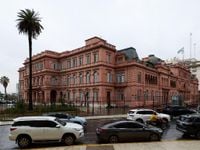On August 20, 2025, the ornate halls of Argentina’s presidential palace, Casa Rosada, played host to a meeting that bridged faith, history, and diplomacy. Elder Quentin L. Cook, a leading figure in The Church of Jesus Christ of Latter-day Saints, sat down with Argentine President Javier Milei in an encounter that, by all accounts, was as meaningful as it was symbolic. The timing was no accident: Elder Cook was in Buenos Aires for the Tabernacle Choir at Temple Square’s centennial celebration of the restored gospel of Jesus Christ in South America—a milestone that traces its roots back to a singular moment of dedication a century ago.
According to the Church Newsroom, Elder Cook described the meeting with President Milei as "marvelous," explaining, "We were quite frank with him that we felt like we have been given a wonderful gift in this country as a result of its dedication a century ago." This sentiment echoed the deep gratitude felt by the Church for the role Argentina has played in its South American journey, a journey that began in earnest in 1925.
It was in that year that Elder Melvin J. Ballard, another member of the Quorum of the Twelve Apostles, traveled to Buenos Aires on a mission that would shape the future of the Church on the continent. In a heartfelt prayer, Elder Ballard asked God to open South America for the preaching of the restored gospel of Jesus Christ. That prayer, Elder Cook explained, was not just a plea for spiritual expansion but a blessing for the leaders and people of South America. "I love the fact that in the dedicatory prayer, Elder Melvin J. Ballard had a whole paragraph blessing the heads of state and that there would be relationships with them and that they would bless the people," Elder Cook reflected, as reported by Church Newsroom. "And so even from the initial prayer of dedication of all of South America, he was recognizing the significance of leaders of the nation."
The centennial celebration of that prayer—and the subsequent growth of the Church in South America—provided a fitting backdrop for Elder Cook’s meeting with President Milei. The Tabernacle Choir at Temple Square, renowned around the world for its stirring performances, was in Argentina not only to commemorate 100 years of the gospel’s presence but also, as Elder Cook put it, to express gratitude. "This is a small token and a way of saying, ‘Thank you for all that this country has done for the Church and its people and those who are of our faith,’" Elder Cook told President Milei, according to the Church Newsroom.
Elder Cook did not attend the meeting alone. Accompanying him were several other key figures: South America South Area President Elder Joaquin E. Costa, Tabernacle Choir President Michael O. Leavitt, and Church Hosting Director Gordon H. Smith. Their presence underscored the significance of the occasion, both for the Church and for Argentina’s role in its story.
Gordon H. Smith, reflecting on the experience, told Church Newsroom, "Among all of our meetings, the meeting with President Milei was a standout. It was important to the Church because when you meet with the chief executive of a nation, it sends a message to the entire government that you count, that you're included, that you matter." For Smith, and for many others in attendance, the symbolism of the moment was as important as the substance. Meeting with the president of Argentina wasn’t just a diplomatic courtesy—it was a powerful affirmation of the Church’s place in the nation’s social and religious fabric.
Building relationships with government and religious leaders has long been a hallmark of the Church’s approach in South America and beyond. Elder Cook emphasized this point during his conversation with President Milei, stating, "We sustain leaders, and we want to have relationships with them, and we want to understand some of their objectives." That openness to dialogue, he explained, goes hand in hand with the Church’s commitment to humanitarian work. "There are opportunities, particularly on the humanitarian side of things, where we can work together. Doing good in the world is something we do because we love the Savior and follow Him. We haven’t become a humanitarian organization disconnected from our mission, which is to follow and live the commandments of Jesus Christ."
The meeting at Casa Rosada thus became more than a polite exchange of pleasantries. It was an opportunity for the Church to reaffirm its dedication to service, mutual respect, and collaboration with Argentina’s leaders. Elder Cook’s remarks made clear that the Church’s humanitarian efforts are not an end in themselves but a natural extension of its spiritual mission. "Doing good in the world is something we do because we love the Savior and follow Him," he said, underscoring a message that resonates with believers and non-believers alike.
The centennial of the restored gospel’s arrival in South America offers a moment to reflect on the remarkable changes that have taken place over the past hundred years. When Elder Ballard offered his dedicatory prayer in 1925, the Church was a fledgling presence in Argentina. Today, it is a vibrant and growing community, deeply woven into the country’s religious landscape. The Tabernacle Choir’s visit, and the high-level meeting with President Milei, speak to the enduring impact of that initial act of faith and the relationships that have blossomed since.
For President Milei, the visit was an occasion to engage directly with leaders of one of the world’s fastest-growing faiths. For Elder Cook and his delegation, it was a chance to honor the past, celebrate the present, and look forward to new opportunities for partnership and service. The conversation, characterized by mutual respect and gratitude, highlighted the ways in which faith communities and governments can work together for the common good.
The centennial celebration and the meeting at Casa Rosada are reminders that history is shaped as much by moments of prayer and dedication as by policy and politics. As Elder Cook and his colleagues departed the presidential palace, they carried with them not only the memories of a marvelous meeting but also a renewed sense of purpose—a commitment to continue building bridges, fostering understanding, and serving the people of Argentina and South America in the spirit of the prayer offered a century ago.
In the end, it’s the quiet acts of gratitude, the willingness to listen, and the shared desire to bless others that leave the most lasting mark. For the Church of Jesus Christ of Latter-day Saints and the people of Argentina, the centennial celebration is both a milestone and a new beginning—a chance to write the next chapter of a story that began, quite simply, with a prayer.




